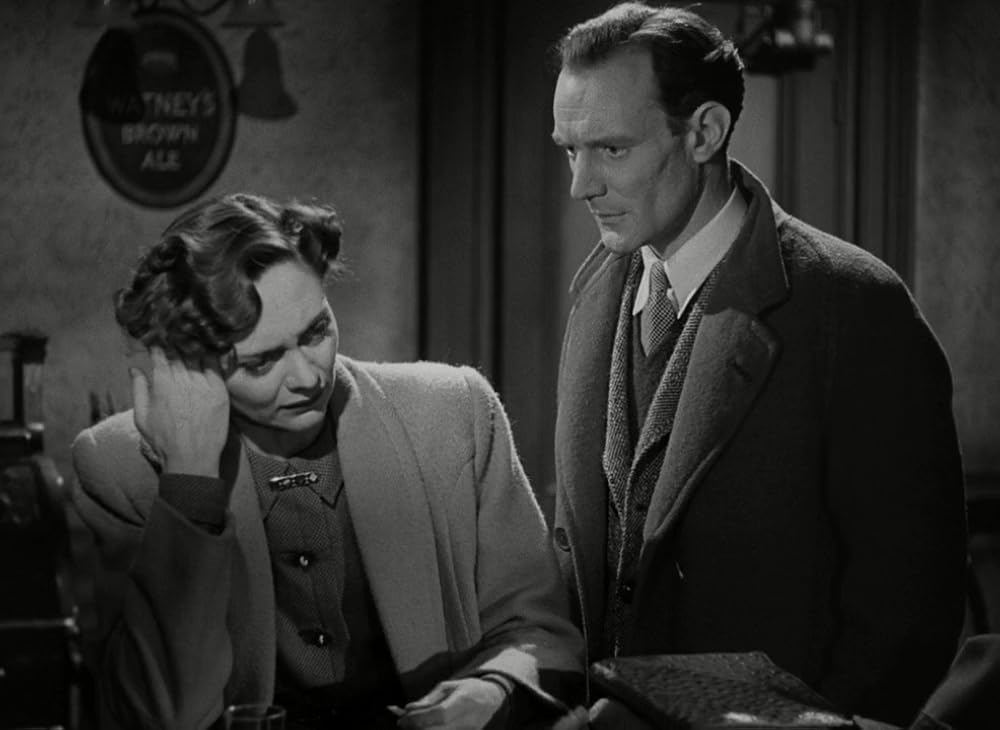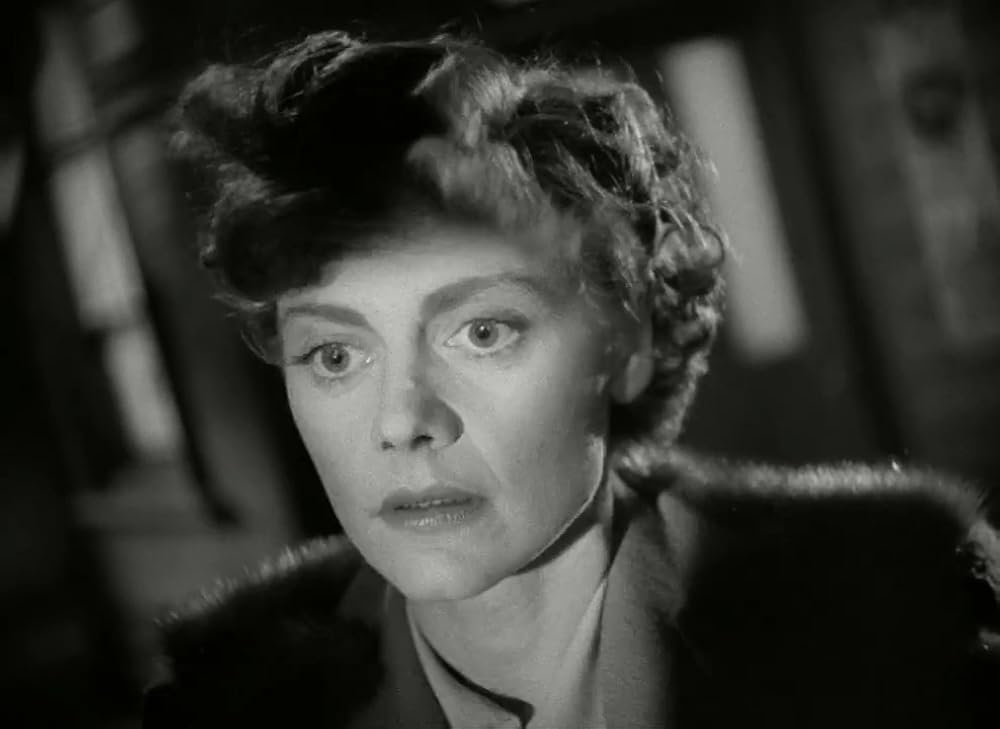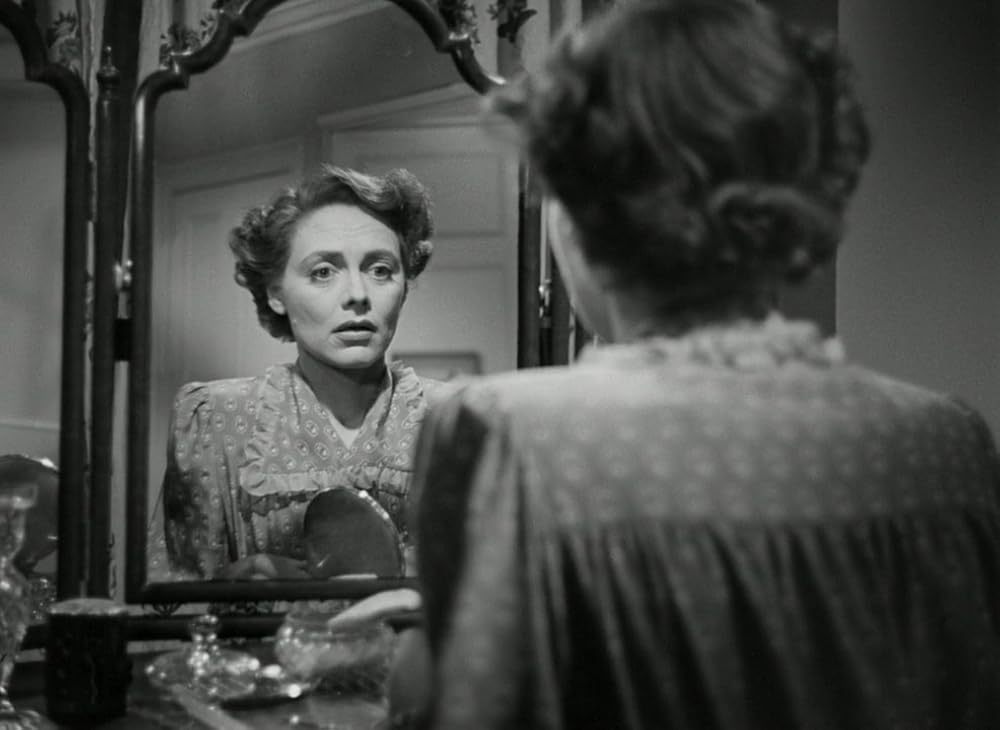| Penny Folger |

Laura Jesson (Celia Johnson) and Dr. Alec Harvey (Trevor Howard) being ravaged here by the violence of love.
Brief Encounter plays at the Trylon Cinema from Friday, July 19th, through Sunday, July 21st. Visit trylon.org for tickets and more information.
A central moment in David Lean’s Brief Encounter that jumps out are these words by its protagonist. “I’ve fallen in love. I’m an ordinary woman. I didn’t think such violent things could happen to ordinary people.”
This little bit of narration is at once melodramatic, humorous, and true.
The nature of romantic love as it’s conveyed by this movie is as something that’s beyond one’s control, with a complete disregard for what’s convenient or even what makes rational sense. This seems to be a universally relatable theme.
Brief Encounter, though it was released 79 years ago, in 1945, has an emotional intensity that makes it feel timeless. Another element of its timelessness is that despite being released right after WWII came to a close, the movie is set in England between the two world wars. Therefore, it is not stapled to any particularly dramatic or defining moment in history. Theirs is not a love made more intense by wartime desperation. As Noel Coward historian Barry Day puts it, “This is not to do with: they felt like this because they were in a situation where they could have been killed tomorrow.”1 This is passionate love between strangers as a run-of-the-mill everyday occurrence.
You can look up the facts surrounding Brief Encounter—it was Lean’s fourth collaboration with acclaimed playwright Noel Coward—or listen to scholars give personal histories of its makers: Lean’s career was waxing as Coward’s began to wane and they met at the crossroads. But the emotional residue this film leaves us with is the most memorable thing about it: the violence of love that Johnson’s character Laura Jesson refers to. This may be one reason it was voted #2 in the British Film Institute’s 100 British films—a list made in 1999—just below Carol Reed’s The Third Man, and above another David Lean film, his behemoth Lawrence of Arabia.
In Brief Encounter, Lean has fleshed out Noel Coward’s one-act play Still Life, which takes place in the refreshment room of the fictional train station, Milford Junction. The entirety of this play happens in five meetings between its two central characters there, with all other action and anyone not present, including their respective spouses, only being referenced. (Aside from a relationship between a refreshment room and station worker which provides a comic juxtaposition to the drama of the main couple.)
This refreshment room feels like a microcosm of the rest of the world, but also acts as a shelter where secret relationships can play out, away from the trappings of real life in all its responsibilities. One is dragged back to those responsibilities by the call of the train whistle, which functions like an alarm clock going off, waking one up to the inevitable demands of the outside world. It’s a waiting room from which its characters are completely controlled by the shifting schedule of the trains.
Lean loved trains since childhood and wove them through many of his films. The trains in this movie create a structure around which its character’s entrances and exits revolve, and one could argue that the station itself is a character, one that controls the fates of all the film’s other characters.

Brief Encounter’s three central characters: two tormented would-be lovers and a train.
It was Lean’s cinematic skills that turned a 45-minute one-room play into an 87-minute visually arresting multi-location feature film. Yet while the play presented its two characters evenly, the film version takes place from the point of view of only one of them.
Lest it be branded a “women’s picture,” a popular genre in its day, this film takes place primarily in the mind of its leading lady, with the implication that we don’t know how much of this love is imagined or slanted by her own emotional state. The play may have been presented more evenly, but in the film we never see the point of view of Dr. Alec Harvey, its male lead, played here by Trevor Howard. We only know his character by what he says and by Laura’s impressions of him.
Much of this movie hinges on Celia Johnson doing what she described as a silent film performance, because she has the difficult task of emoting alongside her own voiceover: she had to deliver both a vocal audio-only performance and then a separate performance that takes place completely in her facial expressions.
Wrote Johnson at the time of filming, “It is going to be most awfully difficult—you need to be a star of the silent screen really because there’s such a lot of stuff with commentary over it—it’s terribly difficult to do.”2

Celia Johnson doing her best silent film acting.
Johnson’s Laura is cute but not a stunning beauty by Hollywood standards. She is ordinary-looking, which grounds the film, making her and therefore the story that much more relatable. Said Kate Fleming in her memoir on Johnson, “Celia was not exactly pretty, so when the doctor (Trevor Howard) goes to help her get the speck out of her eye at the beginning of the film, it is clear he is doing so out of a pure desire to help, not to pick her up.”3 This ordinariness tells us this is not a love story happening in a fantasy world. The normality of these people seems to be part of the point, the idea that this could happen to anyone.
There is one moment in the film that curiously happens outside Laura’s point of view, as she isn’t present when it occurs, even though the story is being relayed by her in a flashback. Film historian Bruce Eder argues that this “destroys the coherency and structure of the film” while adding “nothing of consequence,”4 but I am willing to suspend disbelief and I think it adds something valuable to the story. We see the condemnation the outside world might give them if they were to continue their affair, as we run into the only friend of either party who has figured out what is actually going on between them. He expresses that he is “disappointed” in Alec.
Another way we see them morally compromised as the result of this situation is when Laura lies when she doesn’t want to. As she says to Alec in the film, “I don’t want to pretend anything, either to you or to anyone else. But from now on, I shall have to. That’s what’s wrong, don’t you see? That’s what spoils everything.” She catches herself in the mirror after she has lied to her husband, and it’s as though she’s doing so almost involuntarily. She reacts with a subdued horror.

Johnson’s Laura shows subdued horror at the life of deception she has entered into at the hands of love.
At one point early on, Alec and Laura attend a movie with the ridiculous title “Flames of Passion,” which they walk out of. Although this title was an inside joke by Coward about what you could get away with on film vs. the stage based on his own personal experiences, it’s also a funny visual metaphor for their real-life situation.
One must also consider that in this era, the cultural norm was to get married and have children at a much younger age than it is today. Perhaps a partner you chose at age 20 becomes less alluring or appropriate a few decades later. Laura’s partner in this film, Fred, seems kind and agreeable. As she says, “I am a happily married woman, or rather I was, until a few weeks ago.” So, this love affair does not spring forth merely because she is trying to escape from an unhappy situation.
Apparently, the lower classes were less patient with the repressed agony of middle-class love not consummated, and much to Lean’s horror there was laughter at an infamous advanced screening in the rough town of Rochester. Shouted one patron, “Hisn’t ‘e hever goin’ to ‘ave it orf wif ‘er or hisn’t ‘e?”
Some of the intoxicating allure of this film is the promise that you could meet someone righter for you than whomever you’re already with. Johnson’s Laura isn’t unhappy in her own life before they meet. She seems to have a stable, loyal partner, a home, children. Perhaps Alec represents for her some kind of hidden longing for excitement beyond her comfortable, predictable, middle-class life.
Brief Encounter touches subliminally on whether love is more exciting when it’s fleeting and forbidden as opposed to something that sits around daily, year in and year out, collecting dust. The main characters experience sudden passion and are made miserable by it due to their impossible life circumstances. But one could argue they are still in the honeymoon phase, when hormones and emotions are highest, and not, say, 10 years into a marriage. The film raises questions about what the nature of love actually is.
Footnotes
1 Barry Day, Interview, The Criterion Collection, 2012.
2 Kate Fleming, Celia Johnson: A Biography, Weidenfeld & Nicolson, 1991.
3 Kate Fleming, Celia Johnson: A Biography, Weidenfeld & Nicolson, 1991.
4 Audio commentary by Bruce Eder, The Criterion Collection, 2000.
Edited by Olga Tchepikova-Treon
